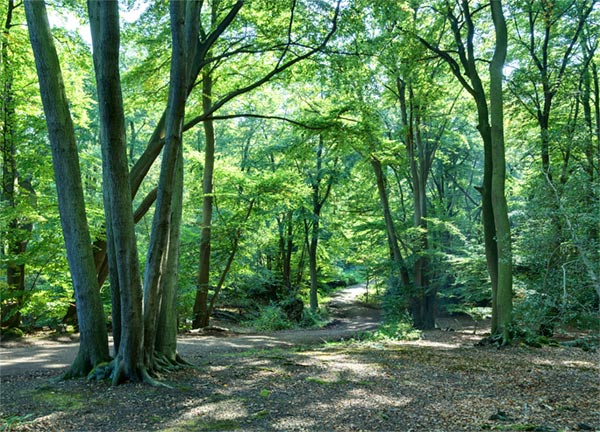An English Wood
by Robert Graves (pub 1923)

This valley wood is pledged
To the set shape of things,
And reasonably hedged:
Here are no harpies fledged,
No rocs may clap their wings,
Nor gryphons wave their stings.
Here, poised in quietude,
Calm elementals brood
On the set shape of things:
They fend away alarms
From this green wood.
Here nothing is that harms –
No bulls with lungs of brass,
No toothed or spiny grass,
No tree whose clutching arms
Drink blood when travellers pass,
No mount of glass;
No bardic tongues unfold
Satires or charms.
Only, the lawns are soft,
The tree-stems, grave and old;
Slow branches sway aloft,
The evening air comes cold,
The sunset scatters gold.
Small grasses toss and bend,
Small pathways idly tend
Towards no fearful end.
The Cool Web formed our introduction to the Oratorio as a whole; the short extract which we used from this poem is the base for the first section, which conveys the innocence and tranquility of an English wood before the war.
The changing image of the wood forms an essential part of the scaffolding on which the oratorio is built.
When researching this piece, I made the decision very early on that although obviously I have read a great deal about the war one way and another, for this particular purpose I wanted to read only what the people who were there had to say.
When reading Sassoon and Blunden as well as Graves himself on the experience of the fighting in that salient, I was struck by how often, in all three of them, a deep love of the natural landscape and a longing for the physical reality of home was what mattered to them most; what fed their longings and their innate sense of lost peace.
This wasn’t necessarily to do straightforwardly with patriotism, although it sometimes is; Blunden in particular describes with heartbreaking melancholy how the little French village in which he finds himself billeted loses one after another of the beautiful little spots he has grown to love as the front line – and the shells – get closer – the duck-ponds and the mills, the favourite trees, the lovingly tended gardens all gradually giving way to ruin and mud.
But the description of this wood contains more than just a picture of what the world used to be like.
The English wood, as described in this poem and the next – the same passage appears in both – is placed clearly in the contrast to a very different wood, one that would haunt Graves’ imagination all his adult life and here is already informing his imagery as a poet.
In this poem, we are repeatedly told that the peace of the wood rests in its part in ‘the set shape of things’, no metamorphosis here from the known, safe and trusted reality into a barbed and dangerous world of myth and sacrifice. But of course the fact of that denial in itself creates a shiver of fear.
We are being deliberately reminded of the world, with some bardic interventions, of the Greek myths; where the most familiar of things could alter into strange and terrifying shapes; of different circumstances where woods were haunted by the old gods, where innocent grassy glades were drenched with the ritualized sacrifice of young men.. where cruelty and pain and death lurked in the shadows of the undergrowth… those same pitiless old gods who were waiting in the woods that bordered the sunflecked banks of the Somme.
Even in the peace of this first movement the seeds of the future are clear.
